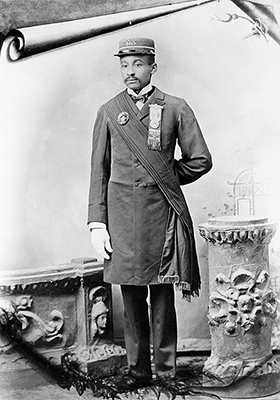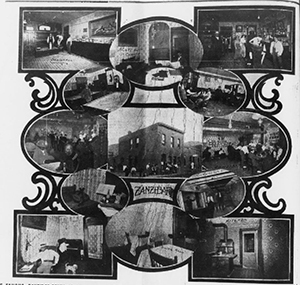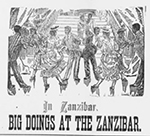The following essays by Anthony Wood are examinations of the role of politics in different aspects of African American life in early Montana.
African Americans and Montana Politics
Dr. Quintard Taylor connects the broader trend of community development to the specific role Jim Crow era politics played in the northern migration of African Americans from the South. [1] Because repressive politics led many black men and women to seek out new homes elsewhere, it was natural that they sought places where they could pursue and fight for progressive political action. This is a main factor brought up by Taylor explaining the prevalence of black communities in both urban areas and in relatively small and isolated places such as Helena and other Montana cities. [2] In places where several hundred black voters could potentially be the deciding factor in elections, petitions, and other local ballot issues, it was generally believed that such places would better foster the political aspirations of African Americans. While this was a general truth in larger cities, Montana was by no means a politically and socially welcoming state for its ethnic minorities.

Historians of African American politics at the turn of the century note a dichotomy in the theory of progressive politics and their practice. [3] The distinction manifested itself to varying degrees, and almost exclusively among white Republicans of the day. It is the distinction between the theoretical rights of African Americans, what the constitution afforded them as citizens, and what rights the larger society chose to afford them. This notion was played out in nearly every aspect of political practice from Reconstruction to the Civil Rights movement and beyond. From lynchings to rigged juries, and systemic disregard for due process and habeas corpus, the socio-political environment which existed made it clear that a color line had been created by white Americans to ensure black Americans never enjoy the rights of citizenship under the law. The very same men that often defended the rights of black men to vote, and to own property, and otherwise engage in a comfortable American life, were also the men that upheld that political color line. They were happy seeing the African American citizenry as equal, so long as they weren’t reminded of it. [4] As such the West quickly developed a social caste in which African Americans were expected to play a certain role. Montana implemented practices, both legal and societal, that established the color line. This took place slowly between 1890 and 1910. The culmination of these policies and practices, the anti-miscegenation law of 1909 which made it illegal for a black man to marry anyone other than a black woman, clearly indicated the “Jim Crowification” of West in the previous decades. [5]
Such was the socio-political environment that Montana’s African American community found itself in in the early twentieth century. Even though nearly every effort had been made to limit the efficacy of black civic life, which may have led to the mid-century theory that African Americans in the West were politically passive, the history of African Americans in Montana politics shows they consistently pushed the political color line while seeking the realization of political and personal aspirations. [6] In short, they refused to be confined to the “role” which the powers that be had created for them. Black Montanans voted, ran for office, pushed for civil rights legislation, sued in court, and most importantly, exercised their freedom of speech. [7] It can be argued that the latter contributed more to the political growth of the black community, and the Montana community as a whole than any other factor.
The following essays are examinations of the role of politics in different aspects of African American life in early Montana.
POLITICS AND THE PRESS
Montana's black newspapers served as an important platform for African American Montanans' political aspirations. The first publication of a black newspaper in Montana was born amidst the early political turmoil of the state’s creation. For several months in 1894 the Copper King William Clark bankrolled The Colored Citizen as part of a $200,000 campaign to win the state capital for Helena. [8] While the paper could be generally characterized as piece of political propaganda for the capital campaign, the editor and local photographer J.P. Ball took every advantage of his new position to advocate for the progress and well-being of his community. Weeks before the vote took place in 1894 The Colored Citizen went out of print. Though short-lived, The Colored Citizen did lay the framework for future publications focused on racial and political issues.
In 1902, Butte barbers John W. Duncan and Chris Dorsey set the type for Butte’s first and only black paper. The New Age ran for nearly a year, leaving print in February 1903.[9] The New Age established itself as an independent voice for Butte’s black residents. While the political tenor was decidedly Republican, in contrast to the many pro-union democratic papers of Butte and Anaconda, its mission stated on the first page was to create a voice “Published in the Interests of Colored People.”[10] If there was any question as to whether or not the black community of Montana was politically or socially passive, the center piece of the first issue of The New Age suggests otherwise.11 In addition to “Pertinent Facts Regarding Our Position” Duncan and Dorsey’s paper published editorials and national stories regarding racial and political topics in every single issue of The New Age. They even produced columns that seemed demonize white Republicans, the party of emancipation, such as “White man’s idea of Heaven.” In this literary piece, the author describes the parade of the good black Christians through the white section of heaven. The white Christians marvel and applaud them as they sing gospels in their beautiful voices, while the angles, who are all white, congratulate the white Christians on helping these new souls to find salvation. The parade ends with the black Christians returning to their “separate but equal” part of Heaven.[12] Such pieces, which appeared frequently, not only highlighted the injustices of segregation, but also illustrated the moral hypocrisy that many white Republicans, in addition to the Democrats, adhered to concerning the “place” of African Americans in a post-reconstruction society.
A third African American newspaper began in Helena in 1906. Differing from its predecessors, The Montana Plaindealer succeeded in being a complete and very relevant source of local, state, and national news. With its ability to center its stories on a wide range of both political and non-political issues, Editor Joseph Bass created a public forum on topics of everyday life that reached over a thousand readers at the papers’ zenith. [13] Where The Colored Citizen focused on the racial politics of the capital campaign, and The New Age attempted to speak eloquently on the broader issue of racism and politics, Bass’ Plaindealer combined local pieces, non-political snapshots of black citizens, and the everyday goings on of Helena with politically charged editorials on events that impacted the lives of the black community. In this way, Bass exposed many members of both black and white communities in Montana to aspects of political and social injustice.
Montana historian William Lang’s article, “Tempest on Clore Street, Race and Politics in Helena, Montana, 1906,” conveys an account of the trials around the closure of the popular black saloon called the Zanzibar, located on Clore Street in Helena. According to Lang and contemporary accounts, the club's co-owner and proprietor Lloyd Vernon Graye's bombastic personality played an important part in the case. [14] Graye was successful, well-dressed (perhaps to the point of opulence) and reportedly a womanizer. [15] His actions had gained him few friends, even among the black community. Joseph Bass, editor of The Montana Plaindealer, noted that many religious people found his morally loose lifestyle reprehensible, but nevertheless still desired he receive a “square deal.” [16] Bass noted in an editorial about the Zanzibar's closure that he believed the actions taken by the city council and police chief only occurred because they viewed Graye as acting beyond his place in their society. According to Bass, it was not that the Zanzibar enjoyed a large white patronage, or its success in general. Instead, the wealthy elite of Helena “feared that [Graye] was making inroads, and really was the object of admiration of damsels of the silk-stocking district of prostitution.” [17] What this means is open to a certain amount of interpretation. Likely, Graye had become the middle-man for white prostitutes. At the time, prostitution in the mining cities of Montana was common and lucrative, and according to Joseph Bass, many wealthy tavern and boarding house owners in Helena benefited from it. One tavern owner and city councilman, Jake Lissner, along with fellow Alderman Henry Longmaid, fought for the closure of Graye’s establishment. [18]
The prosecution hid their vendetta against Graye in the guise of “cleaning up Clore Street." Clore Street, now Park Street, had long been the home of many of Helena’s immigrants and people of color. It was the business district for many Chinese as well as African Americans. Over the years, places along Clore received a rough reputation. Much of that reputation was hyperbole, as it was claimed that it hosted opium dens and places of illegal gambling and saloons whose patronage was solely drunks and minors, not to mention the active red-light district. [19] While aspects of each of these claims were legitimate, they were no less true for the many saloons, boarding houses, and gambling facilities in other parts of Helena that were owned by white “gentlemen.” [20]
The Zanzibar doubtlessly contributed to the many vices of the district, but racism played a central role in the case. It began with city Alderman James “Jake” Lissner presenting the motion to revoke the business license of the club's proprietors, Lloyd Vernon Graye and David Gordon, after two murder cases involving Clore Street prostitutes were investigated. The motion was pressed on the basis that most murders such as the most recent two, and a fabricated estimate that seventy percent of the entire city’s crime, originated at the Zanzibar. [21] When the courts first suspended the license of the businessmen, Graye and Gordon appealed, claiming that no evidence had been presented that any wrong doing occurred at their club. In the appeal process that followed, the true nature of the prosecution emerged. Lissner made passionate pleas against the red-light business ventures and drunkenness of Graye’s saloon, all while his own bar one block east on Main Street was known to be “a rendezvous for immoral women” and the host of many brawls. [22] In the Democratic paper The Helena Independent, the editor decried race mixing, using Graye's reputation of taking up with white prostitutes as an example. The paper maligned Graye's character more than his business actions. [23] For progressive black men like Joseph Bass, this had far-reaching legal implications for the African American community.

The call for a “Square Deal,” what the Republican ticket had promised in the last elections, dominated the appeal process, as well as the rallying of public support. [24] The case Lissner and the city council brought against Graye and Gordon was based on personal vendettas against a much disliked black man, and not on substance. The appeal was upheld and the license reinstated. For some time this appeared to be a great legal victory for progressive politics. However, not long after, Lissner and the Sergeant of Police Leonard Bailey drummed up new evidence and a testimony that Graye had sold beer to minors in October of the previous year. With proof a crime in-hand, the city locked the doors of the Zanzibar forever. [25]
The Zanzibar's closure had many effects on the black community. Foremost was the acknowledgement by the political powers in Helena that black men were still seen as inferior before the law. It was a subtle ruling that on the surface to casual white observers could very well seem just. A known pimp, hustler, and proprietor of a rough club had been found guilty for what everyone would assume to be just one of many legal infractions to take place on his property, and for that his right to operate that business had been revoked. However, to the black community of Helena, the hypocrisy rang too loud for this to be anything less than deeply perverted justice. Lissner’s claim held no moral high ground, as his business was the same as Graye’s. This added to the betrayal of the Republican mayor, Lindsay, who the African American community had been staunch supporters of his election campaign. [26] He had promised all a “square deal,” but here none was given, making every black man and woman fear that the courts provided them no safety at all. The closing of the Zanzibar was a constant reminder of this fact, as it had for years been a place where Helena’s many former Buffalo Soldiers met to reminisce, where young couples could dance and socialize, and even for those more religious and morally upright citizens, the Zanzibar had been a place to meet for various social and civic clubs. The Zanzibar quartet met and practiced weekly at the establishment. During these meetings, men like Joseph Bass, a staunch supporter of prohibition, could be found singing with other more conservative African American men. [27] As such, all members of the black community lost something along with Graye and Gordon.
In spite of the ruling, Helena’s African American community was still on the way up in 1906 and would enjoy another decade of prosperity. Lloyd Vernon Graye continued to operate his successful tailoring shop in the basement of the National Bank building on Main Street. David Gordon, understanding that Graye’s bombastic character was a business liability, broke off his partnership, and bought and opened a saloon directly across the street from Lissner’s club. [28] Gordon found a new and well liked partner in William C. Irvin, who had served as the city’s first and only black police officer. Their new club was a success and ran for several years. Lissner fought his fellow councilmen to decline Gordon and Irvin’s new business license, but was defeated. Perhaps it was the absence of Graye in the proceedings, or that Irvin was held in very high esteem by the white Helena community as a devoted public servant, or perhaps it was in part the public outcry against their decision against the Zanzibar that led members give Gordon, who had undoubtedly been wronged, some small amount of justice.

